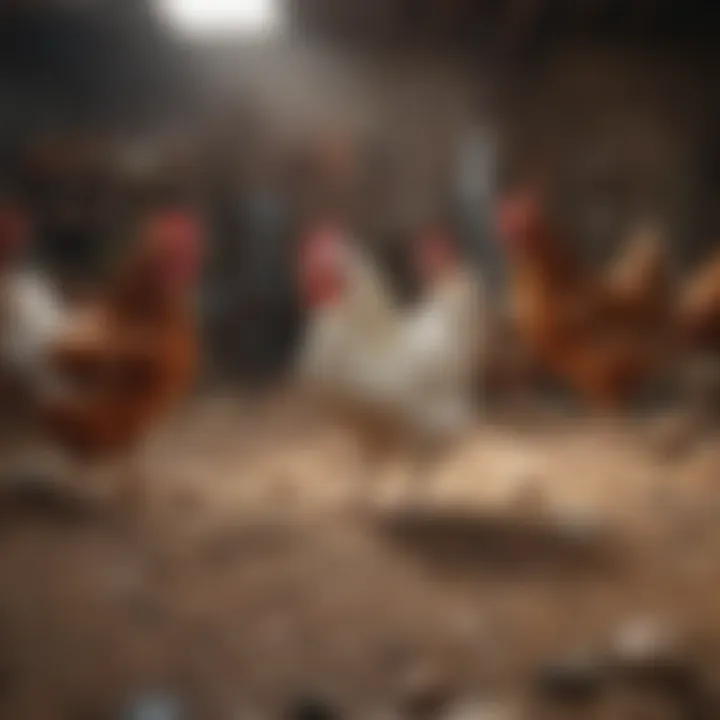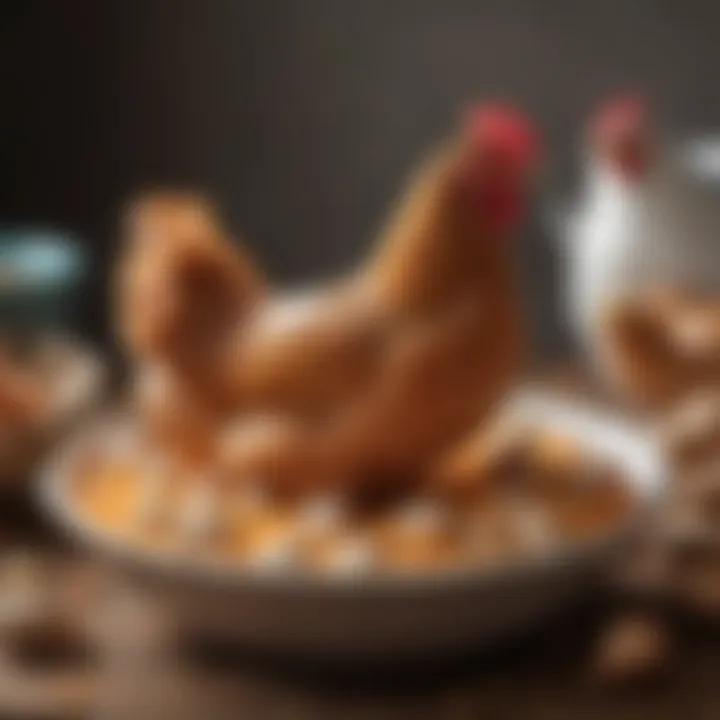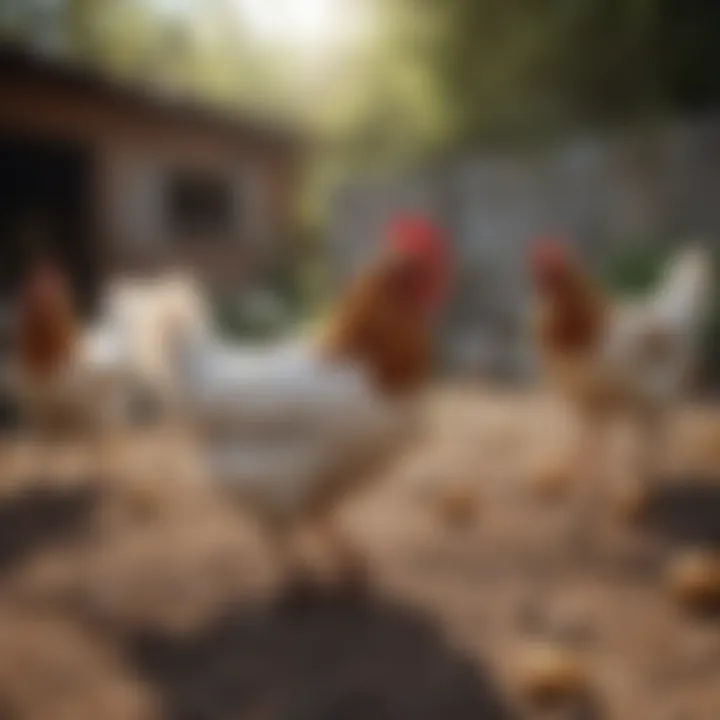Understanding and Preventing Chickens from Eating Eggs


Intro
The behavior of chickens eating their own eggs is a perplexing issue that can frustrate chicken owners. Understanding why this occurs is crucial to forming effective solutions. Various factors contribute to this problem, including environmental conditions, dietary deficits, and behavioral elements. Addressing these underlying causes is necessary for maintaining a healthy flock. The following sections will dissect key aspects of this issue, providing insights and practical solutions.
Understanding the Behavior
Chickens have a natural instinct to peck and explore their environment. Sometimes, this curiosity can lead to egg pecking. Several reasons contribute to this behavior, which can be categorized into environmental and nutritional aspects.
Environmental Factors
A stressful environment can lead to increased egg consumption. Here are some common factors:
- Crowding: Overcrowded coops lead to competition, resulting in frustration and abnormal behaviors.
- Lack of Enrichment: Chickens need stimulation from nature. Without it, pecking their own eggs may become a substitute for foraging.
Nutritional Deficiencies
Nutrition plays a vital role in their behavior. If chickens are not receiving adequate amounts of nutrients, they might seek alternative sources.
- Calcium Deficiency: Insufficient calcium can lead to weaker egg shells. Soft-shelled eggs are easier to break, making them accessible to hens.
- Boredom: A monotonous diet can lead to restless behavior.
"Understanding the motivations behind chickens eating their own eggs can direct effective solutions to mitigate the issue."
Practical Solutions
To effectively address the problem of chickens consuming their own eggs, several strategies can be implemented, focusing on behavioral modification, environmental enrichment, and nutritional adjustments.
Behavioral Modification
Training chickens can sometimes help them change their habits. Here are ways to manage this behavior:
- Positive Reinforcement: Rewarding desired behaviors can encourage healthier habits. Grains or treats can be given when they ignore the eggs.
- Observation: Identifying specific triggers for egg eating will help manage the situation better.
Environmental Enrichment
Enhancing the living space of the flock can significantly reduce egg pecking.
- Space: Ensure there is enough room for chickens, reducing competition.
- Perches and Toys: Adding perches and hanging toys can stimulate their natural behaviors.
Nutritional Adjustments
Adjusting the diet can address deficiencies that contribute to this issue.
- Supplement Calcium: Provide crushed oyster shells or calcium-rich feed to improve shell strength.
- Varied Diet: Incorporate a range of foods to keep them interested and stave off boredom.
Finale
Chickens eating their own eggs is a behavior that may seem puzzling, but it can be addressed through a comprehensive understanding of the underlying motivations. By improving the environmental conditions, adjusting their diet, and implementing training strategies, chicken owners can minimize this issue, ultimately fostering a healthier and more productive flock. By taking the right steps, the incidence of egg consumption can be significantly reduced, ensuring the well-being of the chickens and the satisfaction of the owners.
Preface
The phenomenon of chickens eating their own eggs is not just a curious behavior; it is a significant concern for poultry owners. Understanding this issue is crucial for maintaining a productive flock. The practice can lead to reduced egg production, loss of income, and other negative impacts on flock health.
Chickens typically do not consume their eggs unless there is a distinct reason behind it. Egg eating can be symptomatic of underlying issues such as nutritional deficiencies or stress. Identifying these causes early allows for effective intervention.


In this article, we will explore various aspects related to egg consumption in chickens. We will delve into behavioral patterns, environmental influences, and dietary factors. By integrating practical solutions, chicken owners can address the issue efficiently and prevent future occurrences. The insights provided here aim to equip poultry caretakers with the knowledge needed to promote a healthy environment for their birds.
By addressing this matter, chicken owners can not only safeguard their flock's wellbeing but also enhance their overall production. This makes it essential to comprehend the motives behind egg eating and respond appropriately.
Understanding the Behavior of Chickens
Understanding the behavior of chickens is crucial for chicken owners who want to maintain a healthy and productive flock. Recognizing these behaviors can help prevent issues like egg eating. It is important to know that chickens are not merely agricultural tools; they possess complex instincts and social structures. By understanding their behavior, owners can create environments that promote natural instincts and reduce negative behaviors.
Natural Instincts
Chickens have natural instincts that dictate their behavior. Their instincts drive various actions, including nesting and foraging. Egg eating can occur when chickens mistakenly see the eggs as food or perceive them as a threat to their own survival.
A few key aspects of chicken instinct include:
- Nesting: Hens seek out safe places to lay their eggs. If the nesting area is unsuitable, hens might become stressed and eat their eggs.
- Foraging: Chickens have a natural curiosity and often scratch the ground in search of food. If they discover a cracked or damaged egg, they may instinctively consume it.
- Social Interactions: Chickens are social animals. They communicate and emulate each other. If one chicken starts eating eggs, others might follow.
Understanding these instincts is vital to effectively prevent and address egg eating. By providing proper nesting areas and stimulating environments, owners can help hens act on their natural behaviors positively.
Social Hierarchy Dynamics
Chickens have a established social hierarchy, often referred to as the pecking order. This hierarchy can influence many behaviors, including egg eating. Dominant hens may assert control by pecking or bullying lower-ranking hens. Such stress can lead to anxiety and behavioral issues, including egg consumption.
The impact of social dynamics includes:
- Stress Levels: Higher-ranking hens may stress lower-ranking hens, leading to anxiety and abnormal behaviors. This includes egg eating as a maladaptive coping mechanism.
- Interaction Patterns: The way chickens interact can create an environment where negative behaviors spread rapidly through the flock. If one chicken starts eating eggs, others may imitate this behavior.
- Space Consideration: A crowded coop can exacerbate tensions. When chickens feel confined, they may turn to destructive behaviors, including eating their eggs.
By understanding both natural instincts and social dynamics, chicken owners can create better management practices. This fosters a healthier environment that minimizes stressful interactions and allows chickens to thrive without resorting to egg eating.
Common Reasons for Egg Eating
Understanding the common reasons chickens eat their own eggs is crucial for anyone involved in chicken keeping. This behavior can lead to diminished egg production and eventual health problems within the flock. Identifying the root causes allows owners to implement practical solutions. Therefore, knowing what drives this behavior is foundational to creating a healthier environment for the chickens. The motivations behind this issue often intertwine. They can be related to nutrition, stress, boredom, or even physical damage to the eggs themselves. Managing these factors carefully can significantly reduce the likelihood of egg eating.
Nutritional Deficiencies
Nutritional deficiencies in chickens frequently contribute to egg eating behavior. Chickens require a balanced diet to maintain their health and productivity. Inadequate levels of essential vitamins and minerals can lead to an urge to seek out additional nutrients. If chickens do not get sufficient calcium, they may turn to eggs as a source of this critical mineral. Additionally, a lack of protein can create similar conditions. It is essential to provide a well-rounded feed that meets the specific needs of the flock. Using high-quality feed formulated for layers, along with calcium supplements like crushed oyster shells, can help ensure that chickens receive their necessary nutrients.
Stress and Anxiety
Chickens, like most animals, can experience stress and anxiety. These feelings may trigger egg eating as a coping mechanism. Factors leading to stress can include overcrowding, aggression among birds, or environmental changes. When chickens feel threatened or uneasy, they may lash out in ways that include breaking their own eggs. To alleviate stress, proper flock management is necessary. This includes ensuring ample space, maintaining harmony within the group, and providing a calm, stable environment. Monitoring interactions among birds can be helpful in preventing anxiety-related behaviors.
Curiosity and Boredom
Curiosity can be a double-edged sword for chickens. While exploring their environment is a natural behavior, excessive curiosity can lead them to peck and eat their eggs. Chickens are intelligent and can become bored easily, especially if their living conditions lack enrichment. Enriching the environment can mitigate boredom. This can be done by introducing objects for pecking and playing. Items like hanging vegetables, mirrors, or even commercially available chicken toys can keep them occupied. Thus, a varied environment can help satisfy their exploratory impulses and reduce unwanted behaviors.
Damage to Eggs
Sometimes, damage to the eggs themselves can lead chickens to eat them. Thin-shelled or cracked eggs can tempt chickens. When a hen discovers she can easily access the contents, she may continue this behavior. Therefore, ensuring that eggs are collected frequently and that nesting boxes are clean and secure is of utmost importance. Providing adequate nesting space and proper bedding material can also help reduce the chances of egg breakage. By maintaining the integrity of the eggs, you can deter chickens from consuming damaged ones.
Identifying Egg Eating
Identifying egg eating in chickens holds pivotal importance for flock management. Recognizing when chickens are consuming their own eggs is essential to address the issue before it escalates. Timely identification of this behavior can prevent economic losses and ensure the well-being of the entire flock. Chickens, being social animals, can often engage in behaviors that may be detrimental when one bird starts consuming eggs. This behavior can spread within the flock, making it crucial to monitor and act quickly.
Signs of Egg Consumption


Identifying signs of egg consumption requires keen observation. Some noticeable signs include:
- Broken eggshells: Look for evidence of eggs being broken. Typically, this will be found in the nesting area.
- Increased pecking behavior: If chickens are observed pecking at their nesting boxes or other chickens, this could indicate curiosity or boredom that leads to egg eating.
- Missing eggs: A sudden decrease in egg count can be a tell-tale sign. If hens are laying but fewer eggs are found, investigate further.
- Behavioral changes: If certain chickens appear to be more dominant or aggressive, it may contribute to a stressful environment, often related to egg eating.
Careful observation plays a key role in spotting these signs early. A farmer must learn their flock's normal behaviors to detect any irregularities that might indicate egg consumption.
Monitoring Behavior
Monitoring behavior extends beyond simply watching for broken eggs. Keep a daily log of each chicken’s activity. Pay attention to how often they visit the nesting boxes and time spent in those areas. Noting these patterns can help identify trends that lead to egg eating behavior.
Regular assessments of the flock's environment is equally important. Consider the following aspects:
- Social dynamics: Observe interactions among birds. A strict pecking order can lead to stress, pushing some birds to eat eggs as a means of establishing dominance or due to feeling threatened.
- Nesting box design: Evaluate the structure and placement of nesting boxes. If they are not sufficient or comfortable, chickens may get frustrated and start pecking eggs.
- Overall health: Monitor their health closely. Changes in health can lead to abnormal behavior. Regular check-ups can help catch problems early.
Implementation of consistent monitoring practices greatly aids in demystifying the underlying factors at play within the flock. By paying close attention and documenting findings, any emergence of egg eating can be caught before it becomes a prevalent issue.
Regular monitoring not only addresses the immediate concerns but also fosters a healthier, more harmonious flock.
In summary, recognizing the signs of egg consumption and closely monitoring the flock behavior are fundamental steps towards effective management of this problem.
Preventive Measures
Preventive measures play a crucial role in managing the issue of chickens eating their own eggs. By understanding and implementing these strategies, chicken owners can reduce the likelihood of this behavior emerging. Prevention is often more effective than trying to remedy the situation after it has escalated. This section will discuss the significance of preventive measures and their various aspects that directly address this concern.
Nutritional Adjustments
Optimum nutrition is a cornerstone of chicken health. If hens lack essential nutrients, this deficiency may contribute to egg-eating behavior. Providing a balanced diet rich in proteins, vitamins, and minerals can help mitigate this risk. For example, ensuring that chickens receive adequate calcium will support strong eggshell formation. A thin or fragile shell may break easily, encouraging chickens to eat the contents.
Regularly consider using commercial feed formulated for layers, which generally contains the right nutrient composition. Additionally, supplementing with oyster shells can be beneficial. It promotes healthy eggs and dissuades the urge for chickens to turn to their own eggs for nutrients. Keeping a close eye on their food and water intake also helps maintain their overall health, which can indirectly reduce their inclination to eat eggs.
Environmental Enrichment
Enrichment of the chicken environment plays a vital role in preventing boredom and stress which can lead to egg eating. Chickens are intelligent birds that need mental stimulation to thrive. Without adequate engagement, they may resort to undesirable behaviors such as egg consumption.
To enhance their environment, consider providing various objects for pecking and scratching. Items like hanging vegetables, mirrors, or even simple logs can create interest. Additionally, rotating these items periodically keeps the environment fresh. Allowing chickens access to outdoor spaces can also fulfill their need for exploration and reduce anxiety.
Space Management
Proper space management is essential in minimizing stress among chickens. Overcrowded conditions can lead to competition and aggression, which may increase the tendency for chickens to eat eggs. Ensuring that each bird has enough room to move and access resources can significantly improve their wellbeing.
A general guideline is to provide at least four square feet of space per hen in the coop, and at least ten square feet in outdoor areas. Make sure nesting boxes are sufficient and accessible; having at least one nesting box for every three hens can prevent a crowded situation that leads to frustration.
Proper management of space can lead not only to improved mental health in hens but also to better egg production.
By focusing on these preventive measures, chicken owners can create a healthier environment that minimizes the risk of egg eating. Regular assessment and adjustment of nutrition, environment, and space will contribute to a more harmonious flock.
Implementing Behavioral Modifications
Key benefits of modifying chicken behavior include:
- Reduced egg consumption: By altering behaviors that lead to egg eating, flock owners can significantly lower the chances of this issue.
- Enhanced flock welfare: A well-managed environment promotes overall health and well-being for the birds, reducing stress levels.
- Greater egg production stability: Healthy behaviors support consistent egg-laying patterns, contributing to a steady supply of eggs.
When considering behavioral modifications, it’s important to be aware of the unique characteristics of each bird in the flock. Some birds may be more prone to certain behaviors than others. Observations can reveal individual traits, which can lead to more tailored modifications.


Reinforcing Positive Behavior
Reinforcing positive behavior in chickens involves encouraging actions that are constructive and beneficial for both the birds and the owner. Positive reinforcement is key in modifying the habits of chickens to ensure that they do not consume their own eggs. This can be achieved through different strategies:
- Reward systems: Offering treats and rewards when chickens exhibit desirable behaviors, such as laying eggs in nesting boxes instead of on the ground, can reinforce good habits.
- Consistent routines: Establishing a regular schedule for feeding, egg collecting, and care can help chickens understand expectations, reducing stress and confusion.
- Social reinforcement: Chickens learn from one another. Having a few well-behaved birds in the flock can serve as role models, promoting better behavior through social dynamics.
Overall, positive reinforcement makes chickens feel secure, which contributes to stable environments where egg-eating behavior can be curbed.
Isolation of Affected Birds
Isolation of affected birds is a tactic that can be used specifically when one or two birds are identified as egg eaters within a larger flock. This approach helps to limit the spread of the behavior while promoting recovery and retraining. Considerations for this method include:
- Separating the individual: Temporarily removing the bird or birds that exhibit egg-eating behaviors can help to break the habit, especially if the act is learned from watching other chickens.
- Time for reevaluation: Isolation gives owners a chance to assess the behavior of the affected bird without the influences of the rest of the flock. It can provide insights into why the behavior occurs in the first place.
- Integration strategy: After a set period, it is essential to reintroduce the isolated birds gradually. Monitoring them closely upon reintegration will ensure any negative behaviors do not return.
Alternative Solutions
The issue of chickens eating their own eggs is problematic for many poultry owners. Addressing this concern is necessary to maintain a healthy flock and ensure productivity. Alternative solutions offer various methods that can mitigate this behavior effectively. They can help in not only preventing egg consumption but also enhancing the overall welfare of chickens.
Implementing alternative solutions requires understanding their importance. These methods can significantly reduce the chances of egg eating before it becomes a habit. Each solution comes with unique benefits. For instance, using fake eggs can deter hens from pecking real ones, while effective egg collection techniques can minimize the opportunities for consumption.
Fake Eggs
Utilizing fake eggs is one method that poultry owners can consider. Fake eggs can be made of various materials. They may be ceramic or plastic. By placing these within the nesting boxes, they serve as a visual deterrent against real eggs. Chickens are naturally inclined to peck at objects that resemble eggs. When a hen encounters a fake egg, its curiosity might satisfy its pecking instinct, thereby ignoring the actual eggs.
- Durability: Fake eggs are resistant to breakage, and they require less maintenance compared to real eggs.
- Training Aid: Hens can be trained to avoid eating real eggs if they repeatedly encounter fake ones.
These qualities make fake eggs a clever intermediary in resolving potential egg-eating issues. However, it is essential to ensure that the fake eggs are of appropriate size and shape to resemble real eggs, as this guarantees effectiveness.
Egg Collection Techniques
Another measure poultry owners can adopt involves effective egg collection techniques. The timing of egg collection plays a crucial role. Regularly collecting eggs throughout the day reduces the possibility of chickens discovering them. This minimizes the risk of hens pecking at eggs left unattended in the nesting boxes.
Owners should consider the following strategies:
- Frequent Collections: Collect eggs more than twice daily if possible, especially during peak laying times.
- Nest Box Design: Utilizing covered nesting boxes may prevent hens from seeing the eggs freely, thus reducing temptation.
- Enclosed Areas: Creating separate areas for nesting can also aid in limiting access to the eggs.
"The right egg collection techniques can drastically reduce the chances of hens eating their own eggs."
Monitoring the Flock
Regular Health Checks
Regular health checks are critical for ensuring the chickens are healthy and content. If chickens feel unwell or stressed, they may turn to egg consumption as a coping mechanism. Conducting health assessments helps in identifying underlying issues that might provoke undesirable behavior. Owners should pay attention to aspects such as:
- Physical condition: Check for any visible signs of distress, such as weight loss or lethargy.
- Behavioral patterns: Understanding how the flock interacts can indicate social stress or hierarchy conflicts.
- Dietary intake: It is vital to ensure proper nutrition and correct access to calcium and proteins that keeps hens satisfied.
These health checks should occur at regular intervals. Keeping a record of observations can assist in recognizing any changes in behavior or health, enabling quicker responses to issues. Integration of a health assessment schedule is beneficial.
Adjusting Practices Over Time
As the environment changes, it’s important to adjust practices to suit the needs of the flock. This includes evaluating housing conditions, flock dynamics, and dietary practices. Specifically:
- Environmental factors: Seasonal changes can affect chicken behavior and egg-laying patterns. Regular assessments allow for adjustments in shelter, ventilation, and space.
- Diet refinement: Based on health check outcomes, dietary needs may shift. Monitoring eating habits to ensure that all hens are getting enough nutrition can help reduce egg-eating tendencies.
- Behavioral evaluations: Frequent observations can help recognize changes in social dynamics. If aggression or bullying emerges, it may be necessary to separate certain birds to maintain harmony.
Finale
Effective monitoring and adjustments in care are key elements that should not be overlooked. Regular health checks should become a routine, ensuring that signs of stress or deficiencies are addressed promptly. Training the flock to recognize positive behavior can also aid in curbing this instinctive tendency.
Moreover, the article emphasizes the importance of nutritional balance. Eggs are often targeted due to deficiencies in their diets. Hence, providing adequate supplements and variety in feed can reduce the likelihood of this behavior.
Implementing environmental enrichment is another essential strategy. A stimulating environment keeps chickens engaged, reducing boredom. This can be accomplished by providing ample space, perches, and objects for pecking.







